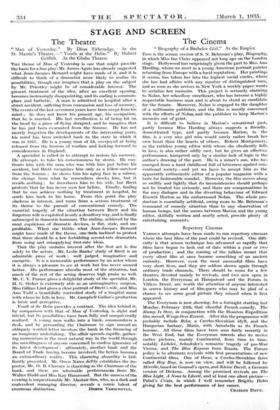STAGE AND SCREEN The Theatre
" Man of Yesterday." By Dion Titheradgc. At the St. Martin's Theatre.—" Youth at the Helm' By Hubert Griffith. At the.Globe Theatre THE theme of Man of Yesterday is one that might provide the basis for a fine play: Mr. James Agate has already suggested what Jean-Jacques Bernard might have made of it, and it is difficult to think of a dramatist more likely to realize its Possibilities, though one imagines that a play on the subject by Mr. Priestley might he of considerable interest. The present treatment of the idea, after an excellent opening, - becomes increasingly disappointing, and its ending is common- place and bathetic. A man is admitted to hospital after a street accident, suffering from concussion and loss of memory. The events of the last seventeen years have been swept from his Mind ; he does not know his present age, his occupation, that he is married. His last recollection is of being hit on the head by a piece of flying shrapnel, and he imagines that he has just been evacuated from 'the Somme. He has not merely forgotten the developments of the intervening years, his mind has been switched back to the state in which it was in 1917. He is a young man of 24, overjoyed at being released from the horrors of warfare and looking forward to convalescence in England.
A specialist is called in to attempt to restore his memory. lie attempts to take his consciousness by storm. He con- fronts him with the man who was with him just before his accident, but Brett recognizes him only as a fellow-survivor from the Somme ; he shows him his aging face in a mirror, the change from what he remembers shocks him, but it recalls -nothing ; he introduces him to his wife, but Brett protests 'that he has never seen her before. Finally, finding that he can achieve nothing by treatment in hospital, he sends him back to his home. From this point the play slackens in interest, and turns from a serious treatment of its theme to the pursuit of conventional. comedy. The essential tragedy of the situation between Brett and his forgotten wife is exploited in only a desultory way, and is finally submerged in domestic humours. The ending, achieved by the most capricious of dramatic devices, is flat, stale, and un- profitable. When one thinks what Jean-Jacques Bernard might have made of the theme, 'oneifeila-inelined to protest that there should be a law forbidding second-rate dramatists from using and misapplying first-rate ideas.
That the Flay sustains interest after the first act is due solely to the actors.. Mr. Leslie Banks' study of Brett is an admirable piece of work ; well judged, imaginative and' energetic. It is a memorable performance by an actor whom it is always a pleasure to see at work but has never seemed better. His performance absorbs most of the attention, but much of the rest of the acting deserves high praise as well. Mr. C. V. France gives a delightful study of the specialist, Mr. H. G. Stoker is extremely able as an unimaginative surgeon, Miss Gillian Lind gives a clear portrait of Brett's wife, and Miss Ann Todd a beautifully controlled study, of a hospital nurse with whom he falls in love. Mr. Campbell Gullan's production is brisk and perceptive.
Youth at the Helm provides a contrast. The idea behind it, by comparison with that of Man of Yesterday, is slight and trivial, but its possibilities have been fully and unequivocally realized. A: young man walks into a bank, commandeers a desk, and by persuading the Chairman to sign unread an obliquely worded letter involves the bank in the financing of an imaginary undertaking. The affair spreads rapidly, gather- ing momentum in the most natural way in the world through the unwillingness of anyone concerned to confess ignorance of its latest development ; ultimately, another bank and the Board of Trade having become involved, the fiction becomes an extraordinary reality. This charming absurdity is bril- liantly presented. Mr. Owen Nares deftly establishes the im- postor, Mr. 0. B. Clarence. is charming as the Chairman of the bank, and there are admirable performanetta..from Mr. Walter Hudd and Miss Kay Hammond. But the success of the evening is unquestionably Mr. Alastair Sim, who, as a dark and malevolent managing director, reveals a comic talent of


























































 Previous page
Previous page